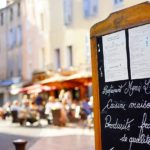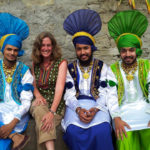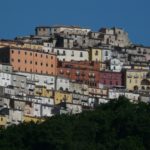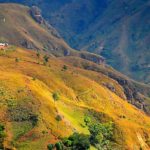Squeaky Wheels: On Travel with a Disability

Squeaky Wheels, Travels with my Daughter by Train, Plane, Metro, Tuk-Tuk and Wheelchair is not what I was expecting. I wasn’t 100% sure I would enjoy reading an entire book about the challenges of travel with a young daughter in a wheelchair, but with some of the work I do involving developing tourism sites, I figured learning about accessibility would be useful. A couple of pages in, I realised this book was going to be much more fun than I’d imagined. Squeaky Wheels is a thoroughly enjoyable, frank mother and daughter tale of self-discovery that dishes up plenty of captivating travel inspiration along the way.
Author Suzannne Kamata was born and bred in the USA but fell in love, married and settled in Japan. An accomplished writer with several awards tucked under her belt, she’s also a teacher and mother of twins, one of whom is the star of this memoir. Although the story centers on Suzanne’s determination to give her multiple-disability daughter Lilia as expansive an horizon of possibilities as she can, the book is a roller coaster of unexpected twists and turns. We gain insights into art, humanity, fragility, determination in the face of the unpredictable. It’s compelling and completely relatable.
We understand from the outset that there will be many physical challenges to overcome throughout the book.
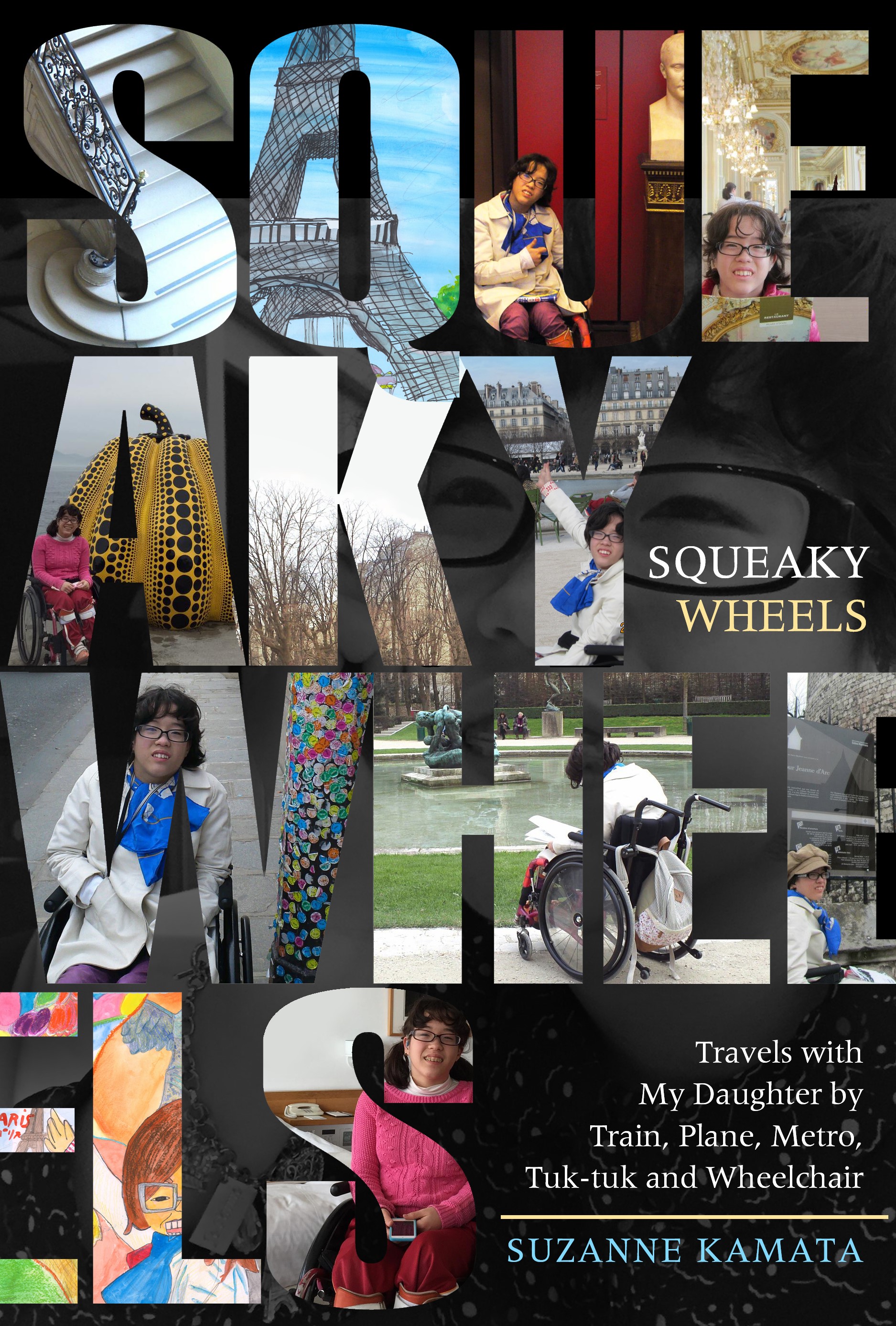 As a travel book, Squeaky Wheels feels like you’ve secured a little-known insider tour. It takes us to some of southern Japan’s attractions, along the way introducing us to idiosyncrasies of rural life in and around Tokushima Prefecture, Japanese kitsch, avant garde art and theater, nature, cities and scenic routes. It’s definitely an ‘off the beaten path’ look at exploring Japan. With many of the places Suzanne takes us to mostly visited by Japanese tourists. If you are like me, tempted by going where the locals go, these spots will probably end up on your travel wish list. And if that’s not your thing, you may find your horizons unexpectedly opening up.
As a travel book, Squeaky Wheels feels like you’ve secured a little-known insider tour. It takes us to some of southern Japan’s attractions, along the way introducing us to idiosyncrasies of rural life in and around Tokushima Prefecture, Japanese kitsch, avant garde art and theater, nature, cities and scenic routes. It’s definitely an ‘off the beaten path’ look at exploring Japan. With many of the places Suzanne takes us to mostly visited by Japanese tourists. If you are like me, tempted by going where the locals go, these spots will probably end up on your travel wish list. And if that’s not your thing, you may find your horizons unexpectedly opening up.
As we visit Suzanne’s family back in the US, we also visit well-known US attractions and quirky local spots. Suzanne powerfully relates the contrasts between where ‘differently-abled’ are well incorporated into the facilities and local psyche, and where ‘differently-abled’ accessibility hasn’t even yet become an item on a to-do list. Her frustration at points is palpable.
Squeaky Wheels: On Travel with a Disability
Squeaky Wheels opens with a scene from the big mother-daughter trip to Paris. We understand from the outset that there will be many physical challenges to overcome throughout the book. What’s less expected are the under-stories as we travel not just through the hot-spots of Paris, but through the complexity of inter-cultural marriages and families too. The author’s balancing of her wishes to fit in with the desire to keep her own culture alive and figure out how to actually give her children the best of both worlds—and through laughter, tears, arguments, teenage logic and discovery. In many ways, it’s a story about any one of us.
I had the opportunity to ask Suzanne a few questions.
Was it a challenge to write candidly about people in your life, knowing that this puts them in the public spotlight? What were some of the considerations you found yourself going through to balance that with the value of highlighting the issue of accessibility and of realising the potential of physically challenged?
Good question. As my children have grown older, and more capable of expressing themselves, I have been more careful about what I write about them. My twins are now 19 – they will be 20 in May, making them legally adults in Japan. I ask them for permission before I write or publish something about them.
We live in Japan, and most of what I write about my daughter is published in English. And it’s read in other countries. I feel that my family’s privacy is pretty well protected here in Japan. I doubt that our neighbors have any idea that I write books. If Squeaky Wheels is ever published in Japanese, I might consider changing some of the names and other particulars.
Squeaky Wheels gives great travel advice that’s not only applicable to parents with kids with disabilities. I gathered so many insights into art, literature, history, food, life and travel in Paris, Japan, USA. Do you see yourself sharing more stories along the themes of this book, whether as follow on books or other resources? Travel, creating independence for kids with disabilities through travel and art, inter-cultural families?
Definitely! My daughter and I have taken some additional trips since we went to Naoshima. The last trip mentioned in the book, which I have written about elsewhere. For example, we went to Okunoshima, aka Bunny Island, off the coast of Shikoku. And to Shodoshima, an island known for its olive groves. I wrote about it in a shorter travelogue for literacy learners called A Girls’ Guide to the Islands (Gemma Open Door, 2017).
As I write this, we are preparing for a mother-daughter trip to Hawaii. Perhaps some writing will come out of that. I am hoping that in the future we can do something more collaborative. For example, incorporating more of Lilia’s sketches and other artwork, and her written observations as well.
Squeaky Wheels: On Travel with a Disability.
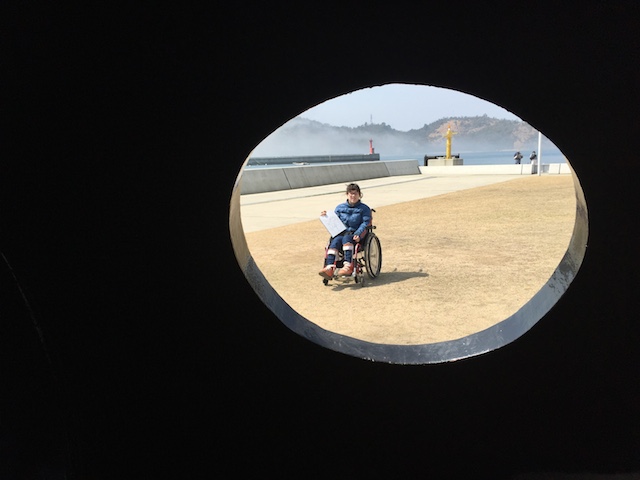
I had a look around the internet for advice on travelling with children with disabilities and I was, frankly, disappointed to see how little there is—much of it is already five or more years old. Do you have specific tips for people who are inspired to take their kids with disabilities on vacation? Looking back, what would be your checklist for prepping and checklist for maintaining sanity when things, inevitably, don’t go according to plan?
Of course, every case is different. But I think it’s important to find out as much as possible before you go. In our case, I always check out accessibility in advance. Is there an elevator? A ramp? Bathtub or shower? I have come to find that accessibility means different things to different people.
Squeaky Wheels: On Travel with a Disability.
I think it’s also important to be flexible, and have a plan B if things don’t work out. And, I have sometimes made the mistake of getting my daughter all excited about something. Only to find that it’s not an option. For example, on a recent visit to a Japanese movie theme park, I promised her that she would be able to dress up in a kimono and get made up like a maiko (geisha-in-training). Only to discover that the make-up station was on a platform and the staff was inflexible about their no wheelchair rule. Hopefully, they will change their policy in the future. But at that time, I had to break the news to my daughter. And then we moved on to another attraction.
If you are thinking of foreign travel, consider visiting more socially progressive countries, which are likely to be more accessible.
I read in an interview on AccessibleJapan.com that Lilia is now more interested in going out with her friends—like a normal teenager!—than exploring with her Mum. Can you tell us a little about how that makes you feel? What’s good, how do you manage to, or do you still encourage her to keep expanding her horizons?
This makes me very happy, actually. I feel like I have done my job. Lilia has now graduated from high school and is learning to live independently in Kyoto. She’s in a group home, doing her own laundry, going out with friends, thinking about getting a job. It was her idea to try this, and I am thrilled for her. It’s possible that she will move back in with us, her parents. But at least she will have had this time of living more or less on her own in one of the most exciting cities in the world.
You can find Suzanne Kamata at her blog, Gaijin Mama, or on you can follow her travels and adventures on Facebook.
Squeaky Wheels: On Travel with a Disability: photo credits by Suzanne Kamata. Have you traveled with a disability? Email us at [email protected] for information about sharing your tips and advice with the Pink Pangea community. We can’t wait to hear from you.

